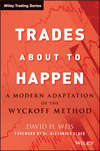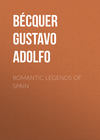Kitabı oku: «Spanish Highways and Byways», sayfa 11
But Spanish children, so caressed and so adored, are nevertheless modest in their bearing, and fall shyly back before a stranger. I remember a beaming grandfather displaying to us two blushing little men, bidding them open their eyes wide that we might contrast colors, turn back to back that we might measure heights, and in various ways put their small selves on show, all which they did in mute obedience, but at the word of release flew together, flung their arms about each other's necks, rolled under the nearest table, and curled up into the least possible bunch of bashful agony.
The pictures, frescos, and carvings of Spanish churches often reflect the looks of Spanish childhood. The Holy Family gives a wide range of opportunity, especially in the ministering cherubs. There is a crucifix in one of the twenty-two aisle chapels of Toledo cathedral, where three broken-hearted mites of angels, just three crying babies, are piteously striving to draw out the nails from the Sufferer's hands and feet. Many of the saint-groups admit of child figures, too, as the St. Christopher, which almost invariably appears as a colossal nave painting, "the Goliath of frescos."
It would be strange, indeed, if children were not beloved in the country of Murillo. Spain has let the most of his beggar-boy pictures go to foreign collections, but she has cherished his Holy Families and cherub-peopled Annunciations. Such ecstatic rogues as those Andalusian cherubs are! Their restless ringlets catch azure shadows from the Virgin's mantle; they perch tiptoe on the edges of her crescent moon; they hold up a mirror to her glory and peep over the frame to see themselves; they pelt St. Francis with roses; they play bo-beep from behind the fleecy folds of cloud; they try all manner of aerial gymnastics. But a charm transcending even theirs dwells in those baby Christs that almost spring from the Madonna's arms to ours, in those boy Christs that touch all boyhood with divinity. The son of the Jewish carpenter, happy in his father's workshop with bird and dog; the shepherd lad whose earnest eyes look toward his waiting flock; the lovely playmates, radiant with innocent beauty, who bend together above the water of life – from these alone might Catholic Spain have learned the sacredness of childhood. But Spain first showed Murillo the vision that he rendered back to her.
XIII
THE YOLK OF THE SPANISH EGG
"From Madrid to Heaven, and in Heaven a little window for looking back to Madrid." —Popular Saying.
Few foreigners can understand the sentiment of Spaniards for their capital. Madrid is the crown city of Spain, not by manifest destiny, but by decree of Philip II, who, as his nature was, better loved the harsh Castilian steppe, baked by summer suns and chilled by treacherous winds, than the romantic sierras and gracious river valleys where earlier royal seats had been established. If in Madrid the desert blossoms like the rose, it is a leafless rose, for the city has no suburbs. It lacks both the charm of environment so potent in Granada and Seville and the charm of ancient story, which these share with those other bygone courts – Toledo, Valladolid, Valencia, Saragossa. It is not a vital organ of modern European civilization, like artistic Paris or strenuous London. And yet it is more cosmopolitan, and hence less distinctively Spanish than other cities of the Peninsula. It is devoted to the bull-fight and the lottery, abounds in beggars and prostitutes, does not take naturally to commerce, and is sadly behindhand with popular education. Yet Madrileños cannot be persuaded that the skies behold its equal, and even over the Anglo-Saxon stranger its fascination gradually steals.
In the first place, the mirth of the home life beguiles the serious foreigner. Spanish households have a pleasantness quite their own. All the natural vivacity and kindliness of the people find free play at home, where servants sing and children prattle, ladies chatter and gentlemen jest, all in an atmosphere of ease, leisure, and spontaneous sociability. The father is not preoccupied with business, the mother has never dreamed of belonging to a woman's club, the children have little taste for reading, and few books to read. So talking is the order of the day, and, Sancho Panza! how they talk! Lingering half the morning over the desayuno of thick, cinnamon-flavored chocolate, into which are dipped strips of bread, two-thirds of the afternoon over the almuerzo, a substantial repast of meat and vegetables, fruit and dulces, and all the evening over the comida, where soup and the national dish of puchero are added to the noontide bill of fare, they chatter, chatter, chatter, like the teeth of Harry Gill.
Still, as of old, Spaniards are temperate in food and drink. "It's as rare to see a Spaniard a drunkard as a German sober," wrote Middleton three centuries ago. They use more water than wine, and although they have a grand appetite for sweets, they take them in comparatively simple forms. The national lack of enterprise is conspicuous even here, for dearly as the Spaniard dotes on chocolate and sugar, Madrid does not make her own chocolate creams, but imports them from Paris to sell, when they are too hard to eat, at a price too high to pay.
But smoking and talking are indulgences which Madrileños carry to excess. Lounging on the balcony, a gayly painted case of paper cigarettes at hand, they will pass hours in bantering their wives, whom they worship much as they worship the images of Mary, delighting to dress them in fine clothes and glittering trinkets, and expecting in return, it is said, their pardon for a multitude of sins. And when my lord saunters forth to "rest" in one of the iron chairs that line the promenades, or in a café window, or at an open-air table before one of the frequent stalls of cooling beverages, the women of the house flock together in some airy corner, stitching away on their endless embroideries, and receiving, with "a million kisses" and a chorus of shrill welcomes, the mantilla-veiled ladies who come to call.
If the afternoon is frying hot, it is just possible that the gallivanting don will bethink himself to send home a tray of horchata, a snowy, chilly, puckery refreshment, eaten by aid of wafers in the form of little tubes that look and taste much like wrapping paper. This treat gives fresh animation to the emulous tongues. The slightest neighborhood incident, as recounted in such a group, takes on a poetic vividness and a dramatic intensity, and when it is all told over again at the dinner-table, excitement waxes so high that long after the dishes and cloth have been removed the family may still be found seated around the board, flashing a thousand lights of suggestion and surmise on that dull bit of scandal. The husband cannot cease from discussion long enough to read the evening paper, nor the wife to send the little ones to bed, and midnight may find the three generations, from grandfather to four-year-old, still talking with might and main.
Accustomed guests come at once to the dining room, ready to contribute their share to the lively clash of voices, or to take part in one of the characteristic games of a Spanish family circle, as lottery. In this favorite pastime, victory, including a goodly handful of coppers, falls to him whose checked and numbered square of pasteboard is most quickly filled with beans. These are placed on the squares called by the bag-holder, who draws numbers haphazard from his sibylline sack. When the small hours come in, the company may adjourn to the sala for dancing and music, but conversation under cover of these gushes on more impetuously than ever – the Castilian art of arts.
One of the chief graces of the tertulias consists in their informality – their frank simplicity. Even on a saint day – a day consecrated to the saint whose name some member of the family bears – while all the nearer friends drop in for congratulation, with perhaps a gift of flowers, in case of a lady, or sweetmeats for a child, the tertulia requires no further exercise of hospitality than an open door and a feast of words. There is more blithesomeness, for hay santo en casa (there is a saint in the house), but no more parade, with its preliminary fret and fuss.
The streets of Madrid, too, have a curious fascination. In the morning hours there is the picturesque confusion of the market. The donkeys are unladen here, there, and everywhere, and the sidewalks and squares promptly dotted over with bright little heaps of delicious Toledo cherries, Valencian apricots, Murcian lemons, and all the greens of the season. The peasant women, squatted among their lettuces and cucumbers, seem much more interested in gossiping with their neighbors than in securing customers. Babies tumble about, crushing the pinks and roses, and cabmen good-naturedly pick their way as best they can among these various vegetable and human obstacles. Venders of books, too, like to pave the street with rows of open volumes, whose pages are soon dimmed with dust, and artisans, especially cobblers, set up their benches just outside their doors, and add the click of their hammers to the general din.
In the early afternoon the shady side of the street is lined with the outstretched forms of workingmen, taking the indispensable siesta. Some rest their black pates on arm or folded jacket or bag of tools, but plenty of bronzed laborers slumber peacefully all prone on the hot paving, with not so much as a cabbage leaf for a pillow. Beggars lie along the stone benches of the paseos and parks, cabmen sleep on their cabs, porters over their thresholds, and I once turned away from a church I had come far to visit, not having the hardihood to waken the verger, who, keys in hand, was snoring like an organ, sprawled across half a dozen granite steps.
As the cool of evening approaches, the overcrowded houses of the poor pour forth entire families into the street, where supper is cooked and eaten, and all manner of domestic operations carried on. Before every door is at least one black-eyed baby, in a little wooden cage something like a churn, with rim running under the armpits, so that the child, safe from straying or falling, may be left to his own devices. As darkness deepens, out come the stars and the serenos. These latter, in Madrid, no longer cry fair weather, but they hold the keys of the houses – an arrangement that I never learned to take seriously.
Returning from visit or theatre in the evening, I found it difficult to say with requisite solemnity to the driver, "Would you be so kind as to shout for Celestino?" The driver promptly roars, "Celestino!" and twinkling lights come bobbing toward us from far and near, but no Celestino. "He's in the wineshop," suggests Isidro, whose charge begins three houses above. "He's eating iron," asserts Pedro, in the phrase describing those colloquies which a Spanish suitor carries on with his divinity through the grating. Then we all chorus, "Celestino!" and again, "Celestino!" and again, "Celestino!"
At this a cloaked figure comes running across the square, waving a lantern over his head and vociferating jocund apologies: "I regret it extremely. I am stricken with sorrow. But at the first call I was wetting my lips at the fountain, and at the second I was pausing to exchange four words only with the lady of my soul, and at the third I said Vamos! and at the fourth – look you, I am here." So he unlocks the door and lights the stairway with his lantern until I have ascended the first flight, when he cheerily calls out, "Adios!" and shuts me into darkness which I am expected to illuminate for my further climb by striking matches.
Madrid streets are by no means altogether delectable. Some are broad and well kept, but others are narrow, dirty, and malodorous. Worst of all, to my own thinking, is the Madrid stare, which, hardly less offensive than the Paris stare, is more universal. It is amusing to see how fearlessly a matron of eighteen sallies forth alone, while many Madrid spinsters of fifty would not go a block unattended. Nor are annoyances confined to staring. Even in reputable shops a woman soon learns to be on her guard, when her attention is especially called to book or picture, lest it prove "a silliness."
Madrid is better than the cities of Andalusia, and worse than the cities of northern Spain, in its treatment of women. A young Spanish girl cannot walk alone, however sedately, in Seville, without a running fire of salutations – "Oh, the pretty face!" "What cheeks of rose!" "Blessed be thy mother!" "Give me a little smile!" And even in Madrid, Spanish girls of my acquaintance have broken their fans across the faces of men who tried to catch a kiss in passing.
In Madrid, as almost everywhere in Spain, begging is a leading industry. So many beg from laziness or greed that it is easy to lose patience, the most essential part of a traveller's Spanish outfit. The ear is wearied by the everlasting drone and whine: "Oh, dear lady, for the love of God! All day my children have had no bread. Give me five centimos, only five centimos, and Heaven will pay you back. Lady! lady! lady! lady! Five centimos, in the name of all the saints!" And the eye is offended by the continual obtrusion of ulcers, cripplings, and deformities. No less than Seville and Granada, Madrid abounds with child beggars. There were two jolly little cripples on the Prado, who used to race, each on his one leg, to overtake me before I should reach the Museo steps. Another boy, on whose face I never saw a smile, sat at the corner of a street I daily passed, holding out two shapeless blocks of hands. By the gate of the Buen Retiro was stationed a blind man, with a girl wean on his knee. It was pathetic and amusing to see him feeding her the supper of bread and milk, for the spoon in his groping hand and the pout of her baby mouth often failed to make connection.
The prevalence of eye disease in Spain is probably due to sun, to dust, and to generations of poverty. The pounding of a blind man's stick upon the pavement is one of the most common city sounds. The charitable may often be seen leading the blind across the streets. I tried it myself once with an imperious old woman, who clung to the curbstone some twenty minutes before she could muster courage for the plunge, lecturing me fluently all the time on the dangers of a rash disposition. There are, of course, many cases of fraud – cases where, when the day's work is over, the blind see and the lame walk. One of the popular coplas has its fling at these: —
"The armless man has written a letter;
The blind man finds the writing clear;
The mute is reading it aloud,
And the deaf man runs to hear."
Yet it is certain that among the beggars of Madrid is a heartrending amount of genuine misery. One day I passed an aged ciego, sitting on a doorstep, in the Alcalá, his white head bowed upon his breast in such utter weariness of dejection that I paused to find him a copper. But better charity than mine came to comfort that worn heart. A lame old peanut woman limped up to him, with the pity of the wretched for the wretched. She drew from her apron pocket a coin which I had rarely seen —dos centimos, two-fifths of a cent in value. An Austrian, who had lived in Spain four years, told me he had never once encountered that paltry piece of money. But she could not spare it all. "Hast thou one centimo for change, brother mine?" she asked. And the blind man's sensitive fingers actually found in his lean leather purse that tiny metal bit, which only the poorest of the poor ever see in circulation. He gravely kissed the coin she gave and made with it the sign of the cross on brow and breast, saying, "Blessed be this gift, my sister, which thy mercy has bestowed on a man of many troubles! May our Mother Mary keep for thee a thornless rose!"
"And may God, who sends the cold according to our rags, lighten all thy griefs! Rest thou in peace," she replied.
"Go thou with God," was his answer.
Begging was a recognized and licensed industry in Madrid a year ago, though a bill of reform, whose fate I have failed to learn, was then under consideration. A mother would gather her brood about her and go forth for her day's work. They beg up and down their accustomed beat during the morning, eat as their gains allow, lie down in the dust together for the afternoon siesta, and rise to be diligent in business during the hours of fashionable promenade. They stop pedestrians, chase carriages, press into shops to torment the customers at the counter, and reach beseeching palms through the open windows of cafés. Gentlemen escorting ladies are their peculiar victims, for well they know that many a man who never gives under other circumstances is ashamed to seem ungenerous under survey of starry eyes.
There is only one phrase that will shake off the professional beggar, "May God aid you!" On hearing this he makes it a point of religious honor to fall back. But as I could not use that formula without feeling myself something between a shirk and a hypocrite, I had to get on as best I could with the ineffectual, "Pardon me, my brother," to which should properly be added Por Dios (for God's sake).
The Spanish mendicant knows nothing of the Anglo-Saxon feeling, "To beg I am ashamed." No Rare Ben Jonson has thundered in his ears: —
"Art thou a man? and sham'st thou not to beg?
To practise such a servile kind of life?
Why, were thy education ne'er so mean,
Having thy limbs, a thousand fairer courses
Offer themselves to thy election.
Either the wars might still supply thy wants
Or service of some virtuous gentleman,
Or honest labor: nay, what can I name,
But would become thee better than to beg?"
From the Spanish point of view, on the contrary, it is manual labor, not beggary, that stains the escutcheon. A German lady of my acquaintance said to a strongly built man who was pleading for alms, "If you will carry my bag up these stairs, I will gladly pay you." Deeply insulted, he folded his cloak about him with hidalgo dignity, saying, "Madame, I am a beggar, not a laborer." Certain monasteries send out brothers, with plates and bags, on a daily begging round – brothers who may belong to the first families of Spain. The Church is often cited as indorsing mendicancy. Extolling almsgiving as a prime virtue, and itself maintaining a vast number of charitable institutions, it has not yet assimilated modern methods of relief.
A favorite story for children, used as supplementary reading in the schools, is called "The Medal of the Virgin." This is, in fact, a Roman Catholic version of "Fortunatus's Purse." Its small heroine, Mary of the Angels, is an orphan, defrauded by a miser of her rich inheritance and treated with barbarity by the uncle and aunt for whom she is an uncomplaining drudge. But once, in festive hour, they give her five centimos, which this generous innocent promptly bestows on a beggar woman, who holds a baby in her ragged arms. In return, the beggar gives the child a queer, old-fashioned mite of a coin, which turns out to have the Wall Street quality of heaving up a little mountain of gold above itself every hour or two.
Mary of the Angels sallies forth for a tour of the country, pouring handfuls of gold into the laps of the beggars who sit at the church doors and city gates, until she is escorted wherever she goes by an army of the halt and blind singing her praises. At last, having given away such Pyrenees of gold that not a beggar could be found in all the land for a century to come, the footsore little philanthropist begs the Virgin to relieve her of the coin. The Madonna descends in a beam of light, the Christ Child smiling from her arms, yet in the radiant group Mary of the Angels recognizes the objects of her earliest charity. "For I," explains the Madonna, "am the holy beggar from heaven. The poor of the earth give me their tears and prayers, and for such alms do I hold out my hand to all the sorrowful."
Yet the progressive element in Spain is all the more ashamed of the beggars because they are not ashamed of themselves, and a few years may see Madrid swept as clear of mendicancy as is San Sebastian to-day.
Madrid is such an easy-going city that one hardly realizes at first how well it performs certain of its functions. Its water supply, for instance, is excellent, although when one sees the picturesque groups, with those same clay water-jars over which Rebecca smiled on Jacob, lingering about the gray stone fountains, one expects a patriarchal flavor in the liquid. The tramway service of Madrid, everything radiating from the Puerta del Sol, is most convenient, although electricity is a little slow in coming to the relief of horse-flesh. The shops, fairly well stocked, gild commerce with Spanish graces. You accept a chair, you pass the courtesies of the day, the gentleman who serves you, often with cigar in mouth, is seldom sure as to just what goods he has on hand, and is still more rarely dogmatic as to their price.
The tug of war, however, comes in getting them delivered. Ten days before quitting Madrid I bought at one of the best of the librerias a number of books, including several illustrated catalogues of the Velázquez sala. These last were pretty trifles bound in white parchment, and as I intended them for gifts, I wanted fresh copies. "You wish them clean, all of them?" asked the proprietor, with an accent of surprise. I replied that I did, and would moreover be obliged if he could fit them with envelopes ready for mailing. Envelopes he had none, but he promised to tie them up in separate parcels. "And books and bill will come without fail this afternoon?" He looked pained to the heart. "This very morning, señora. You will find them awaiting you on your return." On the third day I sent a note, and on the fifth a boy arrived with the bulk of my purchase, but no catalogues nor bill. I explained to the lad, who smilingly besought me to give myself no concern, that I was on the point of leaving the city for good, and preferred not to go away in debt; but the days passed, and my inability to extort that reckoning became the jest of the household. At last, driven to desperate measures, I went through noonday heat to the store, and actually found that procrastinating bookseller scattering cigar ashes over a little heap of catalogues, while he contemplated the pictures of each copy in turn. "Behold, señora," he exclaimed, as serenely as if not ten minutes had elapsed since our parting, "here I have for you immaculate booklets, stainless, faultless, such as will rejoice those fortunate friends to whom you have the amiability to send them. And I am this instant about to prepare them for the post with inviolate security."
I expressed my obligations, but entreated him to draw up the account and let me settle it then and there, as I was within twenty-four hours of departure. "And in travelling," I added apologetically, "it is difficult to send back money." At the obnoxious word he flung up hands and eyebrows. "Señora!" I left the shop, feeling vaguely that I had been guilty of a flagrant indelicacy, as well as black ingratitude. The catalogues, very slightly wrapped, arrived on the morrow, just in time to be thrust into my shawl strap, and I paid the bill amid the final agitation, so unfavorable to arithmetic, of porters and farewells.
I had worse fortune in trying to subscribe for a certain popular periodical. I went to the office in the designated business hours, to find that, of the three men who should have been there, one had already gone, one had not arrived, and the third had "stepped out for a little rest." The janitor left in charge, a sympathetic person who could not read nor write, thought if I would return on Sunday at my luncheon hour, there might be somebody there qualified to receive my subscription and address, but, he sagely added, "in this world we are sure of nothing."
Madrid possesses the Biblioteca Nacional with valuable manuscripts and something like one million books, handsomely housed, where arrangements are made for over three hundred readers, but here, as in the other Spanish cities, public libraries in the American sense of libraries largely used by the general public are practically non-existent. The bookstores, too, except for the latest Spanish publications, leave much to be desired. As a rule, one can get only the most meagre information concerning texts and editions of the national classics, and the supply of new French novels or new German plays is far less complete than the stock of Paris gloves and German cutlery. This last, so canny have the honest Teutons grown, is usually engraved Toledo.
In variety of weather, however, Madrid surpasses all expectations, furnishing the sultriest heat, the chilliest cold, the dustiest dust, and the most prodigious crashes of thunder and lumps of hail to be found in the meteorological market, and all these within a few hours of one another. But what with fans, braseros, balconies, horchaterias, an army of street waterers, and, most essential of all, an inexhaustible fund of good humor, the Madrileño contrives to live on friendly terms with his climate, although he dares not lay aside his cloak before "the fortieth of May."
Apart from bull-fights and riots, those rages of excitement that seem to indicate a periodical fevering of the southern blood, the Madrileño takes his pleasures with a dignified simplicity. The city is exceedingly rich in open squares, well-shaded parks, and long reaches of green promenade, and here, with several dozen cigarettes and a few coppers for water and agráz, he wiles the hours away, chatting with friends and admiring the ladies who roll past in spruce landaus. Over the gate of the social paradise of Madrid it must be written, "No admittance except in coaches," for a carriage seems essential to high life. Liveried coachman, rather than powdered butler, is the sine qua non. During the hot season this outdoor parade is in gay career at midnight, and whole families, babies and nurses included, may be seen gathered in festive knots around small refreshment tables, within sound of fountain spray and garden music. There are open-air concerts, and concerts in smoke-beclouded halls, greensward dances, and dances stepped on café tables among disordered clusters of bottles and glasses, and there is always the theatre, on which your Spaniard dotes.
In the winter season there is opportunity to enjoy classic drama at the Teatro Español, where the Bernhardt of Spain, "La Guerrero," supported by her grandee husband, Mendoza, holds sway. When I saw them they were using short farces of Cervantes and Lope de Rueda for curtain raisers to a romantic drama by Tirso de Molina and a modern society play by Echegaray. I saw them, too, in Zorrilla's singular dramatic version of "Don Juan," the only play allowed in Spanish theatres on the night of All Saints.
From March to November, however, the Teatro Español is closed, and there is little doing at the Teatro Real, an aristocratic temple of Italian opera. During the summer season the theatrical opportunities of Madrid are mainly limited to the popular zarzuelas, or operettas, four of which are usually given in an evening. Each theatre offers a new programme of these every night, but there is little of literary interest except, now and then, a taking trifle from the pen of Hartzenbusch or Echegaray.
The Madrid theatre recks naught of early risers. The opening vaudeville is seldom under way before nine o'clock; the house is cleared after each performance, and often the encores and repetitions prolong a popular zarzuela quite beyond the hour limit. On the other hand, if the audience is small, the opening piece may be cut down to the merest outline. I remember one such occasion when the boxes were so empty and the farce so familiar that the orchestra fairly chaffed the actors off the stage. "Enough, enough! Thou mayst withdraw!" chanted the lyric lover to an intruding servant. "And so mayst thou," called out a voice from among the violins. "I've told my passion to the stars," continued the actor in his most mellifluous tenor, making the distant love of the Spanish stage to a lady who was smiling frankly on the audacious fiddler. "Poor stars!" interpolated this worthy so sympathetically that everybody laughed, the singer wound up his transports in the shortest possible order, and the remaining scenes were hardly more than pantomime. But such was the universal good nature and indifference to business exactitudes, that neither artists nor ticket-holders took this curtailment of their rights in umbrage.
Among the excellences of Madrid must be counted her museos. The Armería, with its plumed and steel-clad warriors, all at tourney, is no mere lumber room of wicked old iron, as might have been expected, but a new canto of the "Faery Queene." The Museo Naval still smells of the boundless brine and Isles of Spicery. The Museo Arqueológico Nacional sweeps one, as on the magic carpet of Alhambra legend, through the entire tragedy of Spain. Here are the successive leaves of her strange picture-book – scratched, prehistoric flints, grass-woven Iberian sandals, rudely sculptured shapes in sandstone grasping wine cups that suggest whole Rubaiyats, Phœnician anchors, bronze tables of Roman laws, Moorish arabesques, mediæval altars, modern wares and fineries, while barbaric spoils of Peruvian idols, Mexican feather-shields, sacrificial stones, and figures of forest lords speak to the imagination of that vast colonial empire which rose out of a dream to melt again like very dreamstuff, leaving "not a rack behind." These I have seen, but there are twice as many more Madrid museums which I had not time to see, and which, I am told, are no less rich in rarities and no less effective in pictorial beauty of arrangement.
Of the art galleries, who can say enough? The supreme Museo del Prado so magnetizes pilgrim feet that it is hard to spare even a few hours for the Académia de Bellas Artes, with its grand Murillos and calm Zurbaráns, or the Museo de Arte Moderno, with its succession of canvases depicting scene upon scene of death, decay, murder, execution, starvation, battle, torture, frenzy. Whatever is most horrible in the story of the Peninsula – Juana the Mad staring at her husband's coffin, the bloody fall of the betrayed Torrijos and his band, the nobles of Portugal doing shuddering homage to the exhumed corpse of Inez de Castro, all that moves disgust, distress, dismay, seems flaunted here. The technique is French, but the subjects are Spanish. Many of the pictures have historical dignity and faithfulness, a few reproduce the modern national types, with a preference for bull-fighters and anarchists over fishermen and peasants, but one misses the spiritual beauty that went hand in hand with the spiritual terror of the older art. Do the Spanish painters of to-day derive only from Goya and Ribera?


















